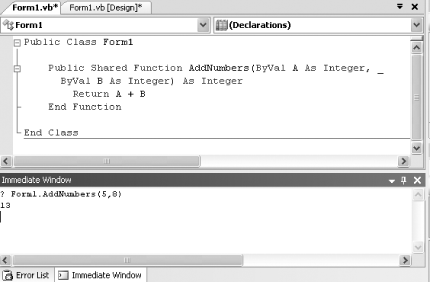Although Visual Studio .NET 2003 included the Immediate window, you couldn't use it to execute code at design time. Longtime VB coders missed this feature, which was a casualty of the lack of a background compiler. In Visual Studio 2005, this feature returns along with the return of a background compiler.
Note
Need to try out a freshly written code routine? Visual Studio 2005 lets you run it without starting your project.
You can use the Immediate window to evaluate simple expressions, and even to run subroutines in your code. To try out this technique, add the following shared method to a class:
Public Shared Function AddNumbers(ByVal A As Integer, _
ByVal B As Integer) As Integer
Return A + B
End SubBy making this a shared method, you ensure that it's available even without creating an instance of the class. Now, you can call it easily in the design environment.
By default, the Immediate window isn't shown at design time. To
show it, select Debug â
Windows â Command from
the menu. Statements inside the Immediate window usually start with
? (a shorthand for Print, which
instructs Visual Studio to display the result). You can enter the rest
of the statement like any other line of code, with the benefit of
IntelliSense. Figure 1-11
shows an example in which the Command window is used to run the shared
method just shown.
When you execute a statement like the one shown in Figure 1-11, there will be a short pause while the background compiler works (and you'll see the message "Build started" in the status bar). Then the result will appear.
Get Visual Basic 2005: A Developer's Notebook now with the O’Reilly learning platform.
O’Reilly members experience books, live events, courses curated by job role, and more from O’Reilly and nearly 200 top publishers.


